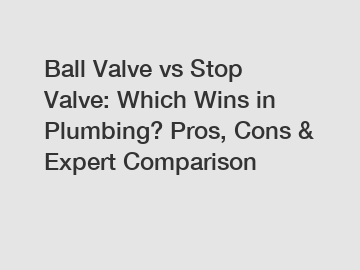Ball Valve vs Stop Valve: Which Wins in Plumbing? Pros, Cons & Expert Comparison
When it comes to plumbing systems, selecting the right valves is crucial for ensuring optimal functionality and longevity. In this article, we will delve into the age-old debate: ball valve vs stop valve. With their unique features and characteristics, choosing between the two can be a challenging task. Join us as we compare and contrast these valves, focusing on their pros, cons, and expert opinions.
1. Understanding Ball Valves:
Ball valves are known for their simplicity and excellent shut-off capabilities. They consist of a hollow pivoting ball with a hole bored through its center. By rotating the ball 90 degrees when in operation, the flow of water is either allowed or blocked completely.

Pros:
- Quick, full shut-off ability.
- Extremely durable and long-lasting due to their sturdy construction.
- Suitable for both high and low-pressure systems.
- Ideal for controlling the flow of gases.
- Excellent heat resistance makes them suitable for hot water applications and industrial use.
Cons:
- Slower to open or close when compared to some other valves.
- Limited control of flow due to two positions - fully open or fully closed.
- Vulnerable to damage in poor conditions, like freezing temperatures or corrosive environments.
2. The Versatility of Stop Valves:
Stop valves, also known as gate valves, offer precise control over the flow of water. They employ a moveable gate, which provides a linear motion to regulate fluid movement. Stop valves are commonly found in residential plumbing systems.
Pros:
- Allow for precise control over water flow, making them suitable for adjusting pressure.
- Easy to install and operate.
- Can be used with both high and low-pressure systems.
- Higher flow capacity compared to ball valves due to the unobstructed passage when fully open.
- Resistant to damage from freezing temperatures or corrosive elements.
Cons:
- Prone to corrosion, especially in areas with hard water.
- Less reliable seal compared to ball valves, which may result in dripping or leaking.
- Longer operating time due to multiple turns required to fully open or close the valve.
- Less durable than ball valves, making them more prone to wear and tear over time.
Expert Comparison and Recommendations:
Plumbing experts recommend the use of ball valves in industrial settings, as they can handle higher pressures and offer quick shut-off capabilities. Their durability and suitability for hot water applications make them ideal for industrial, commercial, and residential systems where reliability is paramount.
On the other hand, stop valves are often preferred in residential settings where precise flow control is necessary. Though they may require more frequent maintenance due to potential leaks, their versatility and easy installation make them a popular choice.
Conclusion:
Choosing between a ball valve and a stop valve ultimately depends on the specific requirements of your plumbing system. Both options offer distinct advantages and disadvantages. If you need a valve that provides quick shut-off, durability, and resistance to extreme conditions, the ball valve is an excellent choice. However, if precise control over flow and ease of installation are your primary concerns, the stop valve may be the better option.
Remember, it's always advisable to consult with a knowledgeable plumber or professional to determine the most appropriate valve for your specific plumbing needs. By considering the pros, cons, and expert opinions highlighted in this article, you can make an informed decision to ensure the smooth functioning of your plumbing system.
Are you interested in learning more about China pneumatic actuator for ball valve manufacturer, China 3pc thread ball valve factory, China marine cast steel valves manufacturer? Contact us today to secure an expert consultation!
164
0
0

Comments
All Comments (0)